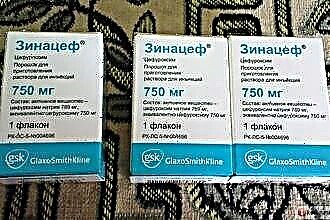Discomfort in the throat, hyperemia of the oropharyngeal mucosa and fever are clear signs of the development of septic inflammation in the airways. If it hurts a child to swallow, be sure to consult a pediatrician. Discomfort in the throat, hyperemia of the oropharyngeal mucosa and fever are clear signs of the development of septic inflammation in the airways. If it hurts a child to swallow, be sure to consult a pediatrician. In the event of pathological symptoms, it is necessary to exclude dangerous viral diseases, such as diphtheria, purulent tonsillitis and mumps.
 The main task of the therapy of ENT diseases is to suppress the activity of pathogens in the foci of inflammation.
The main task of the therapy of ENT diseases is to suppress the activity of pathogens in the foci of inflammation.
To prevent serious complications and stop catarrhal processes, etiotropic drugs are used, which are aimed at destroying infectious agents.
It is possible to alleviate the course of the disease with the help of palliative agents, i.e. anti-inflammatory, local anesthetic, antihistamines and decongestants.
Causes
What to do if a child has discomfort when swallowing saliva? Sore throat and sore throat in most cases are caused by the development of diseases of an infectious and allergic nature. It is possible to determine the optimal treatment regimen only after clarifying the main cause of inflammation of the mucous membrane of the oropharynx. Due to the practical absence of active adaptive (specific) immunity, children suffer from respiratory diseases much more often than adults.
The following types of ENT pathologies can provoke inflammation of the respiratory system in a child:
- pharyngitis;
- flu;
- diphtheria;
- epiglottitis;
- scarlet fever;
- oropharyngeal candidiasis;
- laryngitis;
- tracheitis;
- angina;
- measles;
- allergy.
The choice of drugs of etiotropic action depends on the nature of the causative agent of the infection. Antiviral drugs are used to treat viral diseases. Taking antibiotics will be relevant only if the microbial flora develops in the ENT organs. If the symptoms of the disease indicate the allergic nature of the inflammation, antihistamines will allow to stop the pathological processes in the throat.
Determination of the type of disease
What should be the treatment for inflammatory reactions in the mucous membrane of the throat? You can accurately determine the type of infectious agent by conducting a bacterial culture from the pharynx. That is why it is very important, when the first signs of a disease appear, to seek help from a qualified specialist.
In the case of a typical course of ENT disease, the etiological factors of sore throat can be established by concomitant symptoms:
| Type of inflammation | Leading clinical manifestations |
| viral |
|
| microbial |
|
| fungal |
|
| allergic |
|
Important! Some ENT diseases proceed in an atypical form, therefore, only a specialist can accurately determine the type of pathology after examining the patient.
Types of pharmacotherapy
 Treatment of inflammatory processes in the throat with pharmacological agents (medications) refers to non-invasive methods of therapy. Depending on the causes of the development of the disease, the presence of complications and the nature of the inflammation, various methods of drug treatment can be used, namely:
Treatment of inflammatory processes in the throat with pharmacological agents (medications) refers to non-invasive methods of therapy. Depending on the causes of the development of the disease, the presence of complications and the nature of the inflammation, various methods of drug treatment can be used, namely:
- etiotropic therapy is one of the most effective methods of treatment aimed at eliminating the cause of the development of pathological processes in the ENT organs; medicines of etiotropic action include antimycotics (antifungal agents), antibiotics, antiviral drugs, etc .;
- pathogenetic therapy - aimed at eliminating the main mechanisms of the development of pathology; medicines in this category include antiphlogistic, antihistamines and psychotropic drugs;
- symptomatic therapy - aimed at stopping the clinical manifestations of ENT disease, but at the same time does not affect the mechanism of development of the pathology itself; palliative drugs include antipyretics, analgesics, decongestants and antitussives;
- substitution therapy - is used with a lack or complete absence of the necessary nutrients; substitution therapy medicines include vitamin and mineral complexes, interferon preparations, etc.;
- preventive therapy - is carried out in order to exclude recurrence of inflammation; preventive medicines include immunostimulants, antiviral and disinfectant medicines.
Important! Improper use of medications can cause the development of idiosyncrasy and allergies.
What to do if a child has a sore throat, painful swallowing? An integrated approach to resolving the issue allows you to speed up the healing process and prevent relapses of the disease. The use of symptomatic drugs does not prevent the development of pathogenic flora. Inadequate treatment of ENT diseases can aggravate the child's well-being and cause serious complications.
Traditional therapy methods
 Therapy of infectious ENT pathologies should be comprehensive, pathogenetically and etiologically grounded. When carrying out treatment, it is necessary to take into account all the pathological factors involved in the development of the inflammatory process. To speed up the healing process, it is necessary to use medications aimed at reducing the activity of pathogens, neutralizing their metabolites and increasing the resistance of the child's body.
Therapy of infectious ENT pathologies should be comprehensive, pathogenetically and etiologically grounded. When carrying out treatment, it is necessary to take into account all the pathological factors involved in the development of the inflammatory process. To speed up the healing process, it is necessary to use medications aimed at reducing the activity of pathogens, neutralizing their metabolites and increasing the resistance of the child's body.
As part of the conservative therapy of ENT diseases, the following treatment methods can be used:
- rinsing;
- compresses;
- inhalation;
- physiotherapy;
- medicines.
In the treatment of infectious patients, special attention should be paid to the diet.
A sore throat increases the risk of trauma to the mucous membranes from hard food particles. To prevent complications, while undergoing drug therapy, it is advisable to refrain from eating foods that irritate the ciliated epithelium - citrus fruits, spicy foods, hot drinks, etc.
Antibacterial drugs
How and with what to treat at home catarrhal and purulent inflammation in the oropharynx in a child? White plaque on the walls of the oropharynx, high fever, malaise, pain when swallowing and hypertrophy of the submandibular lymph nodes most often indicate a bacterial origin of the infection. Antimicrobial drugs can eliminate inflammation, which not only destroy bacteria, but also prevent subsequent intoxication of the body.
Antibiotics are used in the treatment of angina, sinusitis, paratonsillar abscess, epiglottitis, and streptococcal infection.Effective and safe medications include:
 "Augmentin" is a broad-spectrum drug with bacteriolytic properties; destroys aerobic and anaerobic strains of bacteria, which contributes to the regression of inflammatory processes in the throat;
"Augmentin" is a broad-spectrum drug with bacteriolytic properties; destroys aerobic and anaerobic strains of bacteria, which contributes to the regression of inflammatory processes in the throat;- "Amoxicillin" is a semi-synthetic antibiotic that helps to destroy the cellular structures of pathogenic bacteria; it is used in the treatment of purulent-infectious processes in the ENT organs;
- "Zinacef" is a bactericidal drug that destroys gram-positive and gram-negative bacteria; used to treat pharyngitis, tonsillitis, otitis media, sinusitis, etc.;
- "Sumamed" is a macrolide antibiotic of bacteriostatic action, which accelerates the regression of purulent processes in the ciliated epithelium;
- Zinnat is an antimicrobial agent that increases the rigidity of bacterial cell walls, which leads to their death.
Important! When choosing antibiotics for children, preference should be given to rectal suppositories and oral suspensions.
Maintaining normal intestinal microflora is the basic rule that must be observed when carrying out antibiotic therapy in children. Antimicrobial drugs destroy not only disease-causing, but also beneficial bacteria in the intestines, which can lead to a decrease in the body's reactivity. To prevent complications and decreased immunity, you can use "Acidophilus", "Bifidumbacterin" or "Bifidok".
Antiviral drugs
 How to treat colds in children? Antiviral drugs are used to treat diseases of viral etiology. There are at least 6 varieties of drugs, each of which is aimed at destroying certain strains of pathogens. In pediatric therapy, the following can be used to eliminate sore throat: anti-influenza drugs; antiherpetic drugs; broad-spectrum antiviral drugs.
How to treat colds in children? Antiviral drugs are used to treat diseases of viral etiology. There are at least 6 varieties of drugs, each of which is aimed at destroying certain strains of pathogens. In pediatric therapy, the following can be used to eliminate sore throat: anti-influenza drugs; antiherpetic drugs; broad-spectrum antiviral drugs.
For the treatment of children under the age of one year, drugs can be used that do not include toxicogenic components.
The safest medicines include:
- "Viferon" is an immunomodulatory and antiviral drug that increases the phagocytic activity of immunocompetent cells; inhibits the replication of virions, which helps to reduce the number of pathogens in the lesions;
- "Groprinosin" is a drug with antiviral and phagocytic action, which suppresses the production of RNA viruses, which helps to eliminate pathogens in the ENT organs;
- "Tsitovir-3" is an antiviral agent that has a stimulating effect on T-leukocytes, which leads to an increase in the body's resistance;
- "Amiksin" is a low molecular weight interferon inducer that increases the activity of neutrophils, granulocytes, phagocytes and other immunocompetent cells;
- "Remantadin" is an anti-viral drug that prevents the reproduction of viral RNA; increases the killer activity of antibodies against pathogenic viruses.
Not all antiviral agents are used in pediatric practice, therefore, when choosing medicines, you should consult your doctor.
Throat sanitation solutions
How to eliminate discomfort in the throat if there is no temperature? The absence of hyperthermia may indicate regression or chronicity of inflammation. It is possible to relieve a sore throat when swallowing with the help of solution antiseptics, which help to destroy pathogens and epithelialize the affected tissues.
It should be noted that not all preparations are available in a concentration suitable for rinsing the oropharynx. Therefore, before using the solutions, you must read the instructions and, if necessary, dilute the drug with boiled or mineral water.

For sanitizing procedures, it is advisable to use the following types of antiseptics:
- "Hepilor" is an antiseptic and analgesic drug that has a pronounced antiviral and antibacterial activity;
- "Angilex" is an antiseptic solution of analgesic, antimicrobial and antiphlogistic action, which accelerates the regeneration of the affected tissues;
- "Rekutan" is a medicine with wound healing, anti-inflammatory and local anesthetic action; used to eliminate infectious foci of inflammation in the mucous membranes;
- Miramistin is an antiphlogistic antiseptic used in the treatment of otolaryngological and dental diseases;
- "Geksikon" is a solution antiseptic with an analgesic and wound-healing effect, which destroys strains of anaerobic bacteria and viruses.
Important! Oropharyngeal debridement can result in aspiration of the drug solution, so consult your doctor before proceeding.
To achieve the necessary therapeutic results, rinsing must be performed at least 3 times a day. Before use, the solution must be warmed to room temperature to prevent local hypothermia of the affected tissues.
Throat sprays
 If, after using systemic drugs, the child's throat continues to hurt, use anti-inflammatory and wound-healing local anesthetics. Extinguishing the oropharynx with solutions allows to increase the concentration of medicinal substances in the affected tissues, which contributes to the regression of pathological processes.
If, after using systemic drugs, the child's throat continues to hurt, use anti-inflammatory and wound-healing local anesthetics. Extinguishing the oropharynx with solutions allows to increase the concentration of medicinal substances in the affected tissues, which contributes to the regression of pathological processes.
For the treatment of colds, the following types of aerosols are usually included in the pediatric therapy regimen:
- "Stopangin" is a complex preparation of antimycotic, antimicrobial and antiphlogistic action, which reduces pain sensitivity during inflammation of the mucous membranes of the oropharynx;
- "Ingalipt" is an aerosol of disinfecting and antiphlogistic action, which is used to treat tonsillitis, pharyngitis, stomatitis, etc .;
- "Cameton" is a combined preparation of local anesthetic, anti-inflammatory and wound-healing action; prevents the development of pathogens, accelerates tissue regeneration and increases local immunity;
- "Teraflu Lar" is an analgesic, antiseptic and decongestant spray that eliminates irritation of the mucous membranes of the throat.
You can use lozenges to relieve the symptoms of a respiratory illness. They contain components of anti-inflammatory, disinfecting and analgesic action. For the treatment of children, drugs such as Travisil, Septolete, Faringosept, etc. can be used.

 "Augmentin" is a broad-spectrum drug with bacteriolytic properties; destroys aerobic and anaerobic strains of bacteria, which contributes to the regression of inflammatory processes in the throat;
"Augmentin" is a broad-spectrum drug with bacteriolytic properties; destroys aerobic and anaerobic strains of bacteria, which contributes to the regression of inflammatory processes in the throat;

